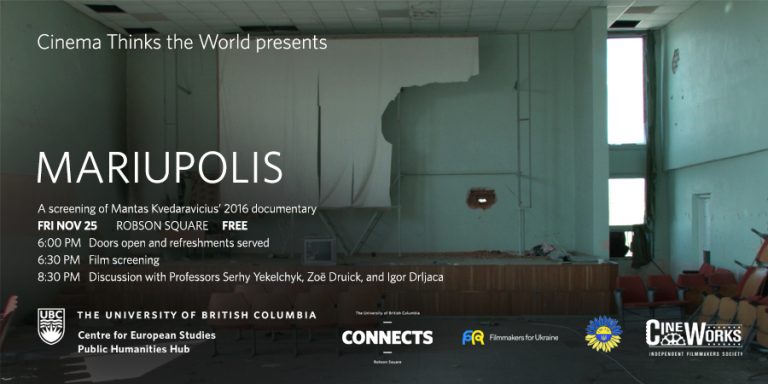
The Cinema Thinks the World research cluster is proud to present a rare screening of the late Mantas Kvedaravicius’s 2016 documentary, Mariupolis. The film takes us to the Ukrainian city of Mariupol in 2016, offering a portrait of a city under the constant threat of a conflict that today has erupted into a full-scale war, and which in March 2022 claimed the life of the film’s director. Join us to watch the film and to discuss it with a range of scholars and thinkers, including Serhy Yekelchyk, Zoë Druick, and Igor Drjlaca. In partnership with Filmmakers for Ukraine, AMS Ukrainian Student Union, and Cineworks, this event is organized by the Public Humanities Hub, UBC Connects at Robson Square, and the Centre for European Studies.
This is the third of five free screenings that will be held at Robson Square as part of the Cinema Thinks the World series.
About the film
A man repairs his fishing net and goes out to the bridge. Two trams run into each other – nobody is hurt and cables are fixed the same day. A small concert is given for factory workers and the sincere performance of a violinist makes them cry. Bombs fall into the sea, no one notices. Everyday life is defined by bomb threats in Mariupol, a city in the Ukraine, situated to the east of the Crimea and once populated by Greeks. It is a visually powerful homage to a city in crisis, dedicated to its poets and shoemakers.
“Cinema Thinks the World” is sponsored by the Public Humanities Hub at the University of British Columbia. Through a series of public screenings, panel talks, and discussions, it aims to explore the ways in which global cinema represents and helps us to think about the world.
Friday, November 25, 2022
6-9PM
Robson Square
800 Robson Street, Vancouver BC V6Z 3B7
FREE and open to all
6:00 PM: Doors open, light snacks and beverages will be provided
6:30 PM: Program begins
6:45 PM: Film starts
8:30 PM: Discussion, Q&A Period
9:30 PM: Program ends
Panelists
Serhy Yekelchyk, Professor of History and Germanic & Slavic Studies at the University of Victoria. Among his many publications are the monographs Ukraine: Birth of a Modern Nation (Oxford University Press, 2007) and The Conflict in Ukraine (Oxford University Press, 2015). He has also guest edited a special issue of Canadian Slavonic Papers on Moving Images: New Perspectives on Ukrainian Cinema and a special issue of Canadian American Slavic Studies on Ukrainian Culture after Communism. Finally, he is the co-editor with Oliver Schmidtke of Europe’s Last Frontier? Belarus, Moldova, and Ukraine between Russia and the European Union (Palgrave, 2008).
Zoë Druick is a Professor in the School of Communication at Simon Fraser University. Her research considers histories, theories and trajectories of documentary and reality-based media with an emphasis on their intersection with biopolitical projects. Her most recent books are The Grierson Effect: Tracing Documentary’s International Movement (BFI 2014, with Deane Williams) and Cinephemera: Archives, Ephemeral Cinema and New Screen Histories in Canada (McGill-Queen’s University Press 2014, with Gerda Cammaer). Other publications include Allan King’s A Married Couple (UTP 2010), Programming Reality: Perspectives on English-Canadian Television (WLU Press, 2008) and Projecting Canada: Government Policy and Documentary Film at the National Film Board (McGill-Queen’s, 2007). Her articles have appeared in numerous anthologies and journals, including Camera Obscura, Screen, Canadian Journal of Communication, International Journal of Communication, and the Canadian Journal of Film Studies. She has co-edited special issues of the Canadian Journal of Communication and the European Journal of Cultural Studies. She is currently working on a monograph on the history of operational media.
Igor Drljaca is a Bosnian-Canadian film director and producer, as well as an assistant professor at University of British Columbia. His films include Krivina (2012), The Waiting Room (2015), The Stone Speakers (2018) and The White Fortress (2021), which has been nominated for two Canadian Screen Awards and three Vancouver Film Critics Circle awards, both including Best Screenplay. Finally, Igor is also a partner with Albert Shin in the Canadian film production company TimeLapse Pictures.